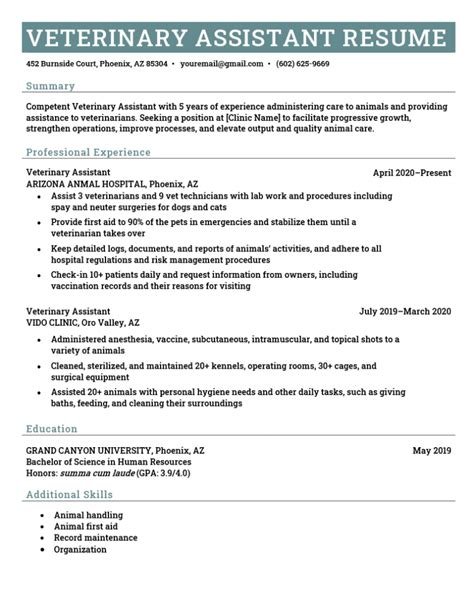“Expert clinician with strong qualifications and training, extensive clinical experience, and specialized skills and certifications. Learn more about my expertise.”Are you looking to start a career as a veterinary assistant? Crafting an impressive resume is the first step in landing your dream job in the animal care field. A well-written resume can help you stand out to potential employers and showcase your relevant skills and experience. In this blog post, we’ll provide you with a veterinary assistant resume sample that you can use as a guide to create your own professional and attention-grabbing resume. We’ll cover key subheadings including Summary of Qualifications, Education and Training, Clinical Experience, and Skills and Certifications. Whether you’re a recent graduate looking for your first job in the veterinary industry or an experienced professional seeking new opportunities, our resume sample will help you highlight your strengths and make a positive impression on hiring managers. Keep reading for valuable insights and tips on creating a standout veterinary assistant resume.
Summary of Qualifications
A dedicated and compassionate veterinary assistant with over 5 years of experience in animal care and support. Skilled in handling and restraining animals with care and empathy, and assisting veterinarians with routine procedures and treatments.
Proficient in medical terminology and record-keeping, with excellent communication and customer service skills. Strong ability to multitask and prioritize duties in a fast-paced veterinary clinic environment.
Certified in pet first aid and CPR, with a deep understanding of animal behavior and nutrition. A team player with a strong work ethic, committed to providing the highest level of care for all animals under my supervision.
Education and Training
When creating a resume for a veterinary assistant position, it is important to highlight your education and training in the field. This section should showcase any relevant degrees, certifications, and coursework that have prepared you for the role.
One example of how to format this section on a resume is to list your highest level of education first, followed by any relevant training or certifications. For example, if you have a Bachelor of Science in Animal Science, this should be listed first, followed by any additional certifications such as Certified Veterinary Assistant (CVA) or completion of coursework in animal handling and restraint.
It is important to include the name of the institution where you received your education and any dates of completion or graduation. This provides employers with a clear understanding of your educational background and the timeline of your training.
Clinical Experience
Veterinary Assistant Resume Sample
When it comes to clinical experience in the field of veterinary medicine, it is essential to highlight any hands-on experience working with animals. This could include internships, volunteer work, or previous employment at veterinary clinics or animal shelters. Additionally, any specialized training or certifications in areas such as animal handling, restraint, or emergency care should be emphasized. Demonstrating a strong understanding of clinical procedures and the ability to work effectively in a fast-paced environment will greatly enhance a veterinary assistant’s resume.
Moreover, detailing any specific tasks or responsibilities carried out during clinical experience, such as assisting with surgeries, administering medications, or providing post-operative care, will further demonstrate a candidate’s capabilities in a clinical setting. Highlighting any experience with various animal species, including dogs, cats, or exotic pets, can also set a candidate apart and showcase their versatility in providing quality care across a wide range of veterinary cases.
Skills and Certifications
As a veterinary assistant, it is crucial to possess a wide range of skills and certifications that will enable you to provide the best possible care for animals. One of the most important skills to have is the ability to handle animals with care and compassion. This includes being able to restrain animals safely during procedures and to calm anxious or scared pets. Additionally, a veterinary assistant should be proficient in administering medications and treatments as directed by a veterinarian, as well as being able to perform basic laboratory tests and procedures.
Another essential skill for a veterinary assistant is strong communication and interpersonal skills. This includes the ability to effectively communicate with pet owners and colleagues, as well as being able to accurately document and maintain records of patient care. Furthermore, it is important for a veterinary assistant to have good organizational and time management skills in order to prioritize tasks and ensure the smooth operation of the clinic or hospital.
In terms of certifications, a veterinary assistant should ideally have completed a formal training program and obtained a certification from a recognized institution. This can include certifications in animal handling and restraint, veterinary office and hospital procedures, as well as certifications in basic veterinary nursing care. Having these certifications can demonstrate to employers that you have received the necessary training and have the knowledge and skills required to excel in this role.
